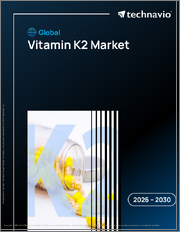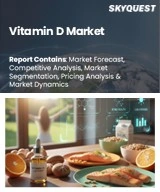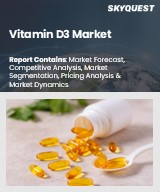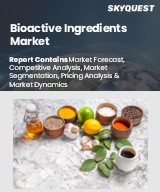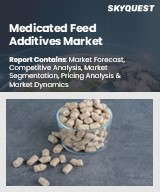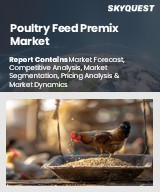
|
시장보고서
상품코드
1623359
비타민 원료 시장 : 지역별(2024-2031년)Vitamin Ingredients Market by Type, Source, Form, Application, & Region for 2024-2031 |
||||||
비타민 원료 시장 평가, 2024-2031년
세계에서 비타민 결핍증의 빈도 증가에 의해 헬스케어 전문가 및 소비자는 영양 요구를 충족하고 관련 건강상 우려를 피하기 위해 강화 식품 및 보충제를 요구하고 있으며, 비타민 원료 시장의 성장을 촉진하고 있습니다. Verified Market Research의 애널리스트에 따르면 비타민 원료 시장은 2023년에는 약 44억 7,000만 달러를 넘어 예측 기간 중 67억 3,000만 달러의 평가에 달할 것으로 추정됩니다.
영양 보충제 및 기능성 식품에 대한 세계 수요 증가와 소비자의 건강 인식이 높아짐에 따라 비타민 원료 시장을 주도하고 있습니다. 이러한 수요 증가로 인해 시장은 2024-2031년 연평균 5.25%의 성장률을 보일 것으로 예상됩니다.
비타민 원료 시장 정의/개요
비타민 원료는 인체가 다양한 생리적 과정을 수행하고 일반적인 건강을 유지하기 위해 소량으로 필요한 화학 물질입니다. 이러한 미량영양소는 체내에서 충분히 합성되지 않기 때문에 식단이나 보충제를 통해 공급해야 합니다. 비타민은 대사 과정, 면역 기능 및 조직 복구에 중요한 역할을 합니다.
또한 의약품, 식품 및 음료, 동물 사료, 퍼스널케어 제품 등 다양한 산업에서 광범위하게 사용되고 있습니다. 비타민은 결핍증 및 관련 건강 문제를 치료하고 예방하기 위해 의약품에 사용됩니다. 음료 및 식품 사업에서 비타민은 영양가를 높이고 제품을 강화하는 데 사용됩니다. 동물 사료에 함유된 비타민은 동물의 건강 유지와 번영을 돕습니다. 또한 피부와 모발에 효과가 있으므로 퍼스널케어 제품에도 사용됩니다.
건강 지향은 비타민 원료 시장에 어떤 영향을 미치는가?
건강과 웰빙에 대한 소비자의 인식이 높아지고 예방적 건강관리에 대한 관심이 높아지면서 비타민 보충제에 대한 수요가 증가하고 있습니다. 만성질환이나 건강상의 어려움을 피하기 위해 헬스케어에 적극적으로 나서면서 비타민 보충제를 일상 생활에 도입하는 사람들이 늘고 있습니다. 이러한 추세는 영양 부족에 취약한 고령화된 세계 인구 사이에서 증가하고 있으며, 이는 비타민 보충제에 대한 필요성과 시장 수요로 이어지고 있습니다.
비타민과 미네랄을 강화해 건강상의 이점을 높인 기능성 식품 분야는 빠르게 성장하고 있습니다. 또한 소비자들은 건강상의 이점과 함께 맛과 편리함을 동시에 얻으려는 경향이 강해지고 있습니다. 영양이 풍부하고 건강 증진에 도움이 되는 제품에 대한 니즈가 유제품에서 무알코올 음료에 이르기까지 다양한 음료에 비타민 원료를 도입하는 것을 촉진하여 시장 확대에 기여하고 있습니다.
또한 전 세계 정부와 보건 기관은 영양에 대한 인식을 높이고 비타민을 포함한 주요 영양소의 적절한 섭취를 보장하기 위한 조치와 법률을 시행하고 있습니다. 이러한 노력은 비타민의 중요성에 대한 대중의 인식을 제고할 뿐만 아니라 식품 및 제약 회사들이 비타민 강화 제품을 개발 및 다양화하도록 자극하여 시장 성장을 가속하고 있습니다.
원료 가격의 급등은 비타민 원료의 매출을 떨어뜨릴까?
비타민 원료 시장은 미국 식품의약국(FDA)과 유럽식품안전청(EFSA)과 같은 기관에 의해 광범위하게 관리되고 있습니다. 이러한 기준은 국가마다 다르고 자주 개정되므로 준수하기가 매우 어렵습니다. 따라서 비타민 제품이 안전하고, 적절한 라벨링이 되어 있으며, 건강 보조 식품의 규제 기준을 충족하는지 확인하는 것은 제조업체에게 복잡하고 시간과 비용이 많이 드는 과정이며, 이는 시장 확대에 한계가 있습니다.
고품질 원료의 조달은 비타민 보충제 제조에 필수적입니다. 그러나 시장은 이러한 원료의 가용성 및 가격 책정 측면에서 제약에 직면해 있습니다. 기후 변화, 농업 관행, 지정학적 긴장은 모두 원료 공급에 영향을 미쳐 가격 변동과 희소성을 유발합니다. 이는 생산 일정, 비용 구조, 수익성에 영향을 미치고 시장 공급을 제한하고 있습니다.
또한 시중에는 다양한 건강 효과를 표방하는 제품들이 넘쳐나지만, 그 중에는 과학적 근거가 없는 제품도 있습니다. 이러한 상황은 비타민 보충제의 효능과 유용성에 대한 소비자의 회의감을 불러일으키고 있습니다. 또한 오염된 제품이나 위조품이 소비자의 신뢰를 떨어뜨려 시장 확대를 방해하고 있습니다.
목차
제1장 세계의 비타민 원료 시장 : 서론
- 시장 개요
- 조사 범위
- 전제조건
제2장 개요
제3장 VERIFIED MARKET RESEARCH의 조사 방법
- 데이터 마이닝
- 밸리데이션
- 일차 자료
- 데이터 소스 리스트
제4장 세계의 비타민 원료 시장 전망
- 개요
- 시장 역학
- 촉진요인
- 억제요인
- 기회
- Porter's Five Forces 모델
- 밸류체인 분석
제5장 세계의 비타민 원료 시장 : 유형별
- 개요
- 비타민 A
- 비타민 B
- 비타민 C
- 비타민 D
- 비타민 E
- 비타민 K
제6장 세계의 비타민 원료 시장 : 용도별
- 개요
- 의약품
- 식품 및 음료
- 퍼스널케어 제품
- 동물 사료
- 기타
제7장 세계의 비타민 원료 시장 : 지역별
- 개요
- 북미
- 미국
- 캐나다
- 멕시코
- 유럽
- 독일
- 영국
- 프랑스
- 기타 유럽
- 아시아태평양
- 중국
- 일본
- 인도
- 기타 아시아태평양
- 세계의 기타 지역
- 라틴아메리카
- 중동 및 아프리카
제8장 세계의 비타민 원료 시장 : 경쟁 구도
- 개요
- 각사 시장 순위
- 주요 발전 전략
제9장 기업 개요
- Abbott Laboratories
- Archer Daniels Midland Company
- BASF SA
- Bluestar Adisseo company
- Farbest-Tallman Foods Corp.
- Glanbia Plc
- Lonza Group
- Nestle S.A.
- Pfizer Inc.
- Rabar Pty Ltd.
제10장 부록
- 관련 조사
Vitamin Ingredients Market Valuation - 2024-2031
The growing frequency of vitamin deficiencies globally is prompting healthcare professionals and consumers to seek fortified foods and supplements to meet nutritional needs and avoid associated health concerns, fueling the vitamin ingredients market growth. According to the analyst from Verified Market Research, the vitamin ingredients market is estimated to reach a valuation of USD 6.73 Billion over the forecast subjugating around USD 4.47 Billion valued in 2023.
The expanding global demand for nutritional supplements and functional foods, together with increased consumer health consciousness, is primarily driving the vitamin ingredients market. This increase in demand enables the market to grow at a CAGR of 5.25% from 2024 to 2031.
Vitamin Ingredients Market: Definition/ Overview
Vitamin ingredients are chemical substances that the human body requires in small amounts to perform various physiological processes and maintain general health. These micronutrients are not synthesized in adequate quantities by the body and must be supplied through diet or supplementation. Vitamins play critical roles in metabolic processes, immunological function, and tissue repair.
Moreover, they have a wide range of applications in industries such as medicines, food & drinks, animal feed, and personal care goods. Vitamins are used in medications to treat or prevent deficiencies and related health issues. In the food and beverage business, they are used to boost nutritional value and fortify goods. Vitamins in animal feed help animals stay healthy and flourish. They are used in personal care products because of their benefits to the skin and hair.
What's inside a VMR industry report?
Our reports include actionable data and forward-looking analysis that help you craft pitches, create business plans, build presentations and write proposals.
What will Health Consciousness Draw for the Vitamin Ingredients Market?
The growing consumer awareness regarding health and wellbeing, combined with an increased emphasis on preventative healthcare, is driving demand for vitamin supplements. People are increasingly incorporating vitamin supplements into their daily routines as they become more proactive in managing their health to avoid chronic diseases and health difficulties. This trend is rising among the ageing global population with high vulnerability to nutritional deficiencies, and thus necessitating vitamin supplements, resulting in market demand.
The functional food and beverage sector, including items fortified with vitamins and minerals for extra health advantages, is quickly growing. Also, the consumers are more inclined towards obtaining taste and convenience along with health benefits from the food and beverages. This need for nutrient-dense, health-promoting products is driving the introduction of vitamin components into a wide range of food and beverage items, from dairy to non-alcoholic beverages, hence contributing to market expansion.
Furthermore, governments and health organizations around the world are implementing measures and legislation to raise nutritional awareness and ensure proper consumption of important nutrients, including vitamins. Such efforts not only raise public awareness of the importance of vitamins but also stimulate the food and pharmaceutical businesses to develop and diversify their vitamin-enriched product offerings, bolstering market growth.
Will Raw Material Pricing Drop the Sales of Vitamin Ingredients?
The vitamin ingredients market is extensively controlled by agencies such as the United States Food and Drug Administration (FDA) and the European Food Safety Authority (EFSA). Compliance with these standards is considerably difficult as they vary by country and are often amended. Thus, ensuring that vitamin products are safe, appropriately labelled, and fulfil dietary supplement regulatory criteria is a complex, time-consuming, and expensive process for manufacturers, leading to limited market expansion.
The procurement of high-quality raw materials is critical for the creation of vitamin supplements. However, the market faces constraints due to the availability and pricing of these raw materials. Climate change, agricultural practices, and geopolitical tensions all have an impact on raw material supply, causing price volatility and scarcity. Thereby, affecting the production schedules, cost structure, and profitability, limiting market supply.
Furthermore, the market is saturated with items claiming various health benefits, some of which are not supported by scientific evidence. This condition is resulting in consumer skepticism about the efficacy and utility of vitamin supplements. Also, instances involving contaminated or counterfeit items undermine consumer trust, impeding market expansion.
Category-Wise Acumens
What Factors Contribute to the Dominance of Vitamin C in the Market?
According to VMR analysis, the vitamin C segment is estimated to hold the largest market share during the forecast period. Vitamin C is widely recognized for its ability to support the immune system. This is especially important in light of global health concerns, such as the COVID-19 pandemic, where people are taking more proactive steps to protect their health and boost their immune systems. The public's heightened health consciousness and desire to avoid illness is greatly boosting demand for Vitamin C supplements.
Vitamin C is a potent antioxidant that protects cells from free radicals. It is also required for collagen formation, iron absorption, and the preservation of healthy skin, teeth, and bones. Vitamin C's numerous health benefits, supported by scientific research, make it a popular choice among customers seeking to improve their overall health and well-being.
Furthermore, Vitamin C's versatility increases its usage in a broad variety of goods, including dietary supplements, fortified meals and beverages, and even cosmetics products. Its potential to improve skin health by increasing collagen formation and decreasing UV damage makes it a prominent ingredient in the beauty and personal care industries. This versatility not only broadens its market reach but also appeals to a diverse range of consumers with various health and wellness objectives.
How Does the Market Address the Convenience of the Tablets and Capsules Segment?
The tablets and capsules segment is estimated to dominate the market during the forecast period. Tablets and capsules are popular among consumers because of their convenience and ease of usage. They are easy to transport, require no preparation, and can be devoured fast, making them an excellent alternative for persons with hectic schedules. This ease of handling and consuming element helps it retain its dominance in the market.
Tablets and capsules allow for precise dosage control, which is critical for ensuring that customers get the right quantity of vitamins for their health without risking underdosing or overdosing. This precision is more difficult to attain with powders and other types of supplements, so tablets and capsules appeal to health-conscious consumers.
Additionally, tablet and capsule manufacturing generates goods that are more stable and have longer shelf life than other forms such as powders. This stability is especially crucial for maintaining the efficacy of vitamins over time, making tablets and capsules a popular choice among both customers and retailers.
Country/Region-wise Acumens
What Role does Rising Health Awareness Play in Driving the Market in North America?
According to VMR analyst, North America is estimated to dominate the vitamin ingredients market during the forecast period. North America, particularly the United States, has a high level of health awareness among its citizens. There is a strong culture of preventative healthcare and well-being, which encourages the use of dietary supplements, especially vitamins. Consumers in this region are proactive in maintaining health and preventing sickness through nutrition, resulting in a high demand for vitamin supplements.
Furthermore, the North American market benefits from a strong regulatory structure, led by organisations like the United States Food and Drug Administration (FDA). These standards protect the safety, quality, and efficacy of dietary supplements, especially vitamins. The availability of such standards increases consumer trust and confidence in the products offered on the market, resulting in higher consumption rates.
What Factors are Driving the Significant Growth of the Market in Asia Pacific?
Asia Pacific is estimated to grow at the highest CAGR for the vitamin ingredients market during the forecast period. Growing middle class in this region have high disposable incomes and a willingness to invest in health and wellness products. This generational transition is a crucial driver of the vitamin ingredients industry, as more people can afford to buy dietary supplements to maintain and improve their health.
Additionally, the expansion of retail infrastructure and the development of e-commerce platforms in the Asia Pacific have made vitamin supplements more widely available. Online sales channels, in particular, provide a simple means for consumers to research, compare, and buy a wide range of health-related products, including vitamins. This ease of access, combined with targeted marketing and education initiatives about the benefits of vitamins, has considerably boosted market growth in the region.
Competitive Landscape
The competitive landscape of the vitamin ingredients market is defined by fierce competition among several competitors fighting for supremacy in a sector known for innovation, research, and development. The landscape is also shifting towards sustainable and clean-label products, which has an impact on product development and marketing tactics.
Some of the prominent players operating in the vitamin ingredients market include:
BASF SE
Koninklijke DSM N.V.
Lonza Group
Archer Daniels Midland Company
Pfizer Inc.
Nestle S.A.
Evonik Industries AG
Ingredion Incorporated
DuPont de Nemours and Company
Dow Chemical Company
Bactolac Pharmaceutical Inc.
AIE Pharmaceuticals Inc.
Atlantic Essential Products Inc.
Bluestar Adisseo Co.
The Wright Group
Glanbia PLC
CHR Hansen Holding A/S
Probi AB
Algatechnologies Ltd.
Nutritional Yeast Company
Latest Developments
In February 2024, BASF SE announced the expansion of its vitamin A production capacity at its Ludwigshafen, Germany, plant to fulfil the growing global demand for vitamin A in food and medicinal applications.
In February 2024, Koninklijke DSM N.V. established a partnership with a major food and beverage firm to develop and offer sustainable vitamin D solutions for fortified goods.
In January 2024, Archer Daniels Midland Company launched a new line of plant-based vitamin and mineral premixes to meet the growing demand for vegan and vegetarian food items.
In January 2024, Evonik Industries AG invested in a new fermentation facility to enhance vitamin B12 manufacturing capacity, meeting the growing demand for this critical mineral.
TABLE OF CONTENTS
1 INTRODUCTION OF GLOBAL VITAMIN INGREDIENTS MARKET
- 1.1 Overview of the Market
- 1.2 Scope of Report
- 1.3 Assumptions
2 EXECUTIVE SUMMARY
3 RESEARCH METHODOLOGY OF VERIFIED MARKET RESEARCH
- 3.1 Data Mining
- 3.2 Validation
- 3.3 Primary Interviews
- 3.4 List of Data Sources
4 GLOBAL VITAMIN INGREDIENTS MARKET OUTLOOK
- 4.1 Overview
- 4.2 Market Dynamics
- 4.2.1 Drivers
- 4.2.2 Restraints
- 4.2.3 Opportunities
- 4.3 Porters Five Force Model
- 4.4 Value Chain Analysis
5 GLOBAL VITAMIN INGREDIENTS MARKET, BY TYPE
- 5.1 Overview
- 5.2 Vitamin A
- 5.3 Vitamin B
- 5.4 Vitamin C
- 5.5 Vitamin D
- 5.6 Vitamin E
- 5.7 Vitamin K
6 GLOBAL VITAMIN INGREDIENTS MARKET, BY APPLICATION
- 6.1 Overview
- 6.2 Pharmaceuticals
- 6.3 Foods and Beverages
- 6.4 Personal Care Products
- 6.5 Animal Feed
- 6.6 Others
7 GLOBAL VITAMIN INGREDIENTS MARKET, BY GEOGRAPHY
- 7.1 Overview
- 7.2 North America
- 7.2.1 U.S.
- 7.2.2 Canada
- 7.2.3 Mexico
- 7.3 Europe
- 7.3.1 Germany
- 7.3.2 U.K.
- 7.3.3 France
- 7.3.4 Rest of Europe
- 7.4 Asia Pacific
- 7.4.1 China
- 7.4.2 Japan
- 7.4.3 India
- 7.4.4 Rest of Asia Pacific
- 7.5 Rest of the World
- 7.5.1 Latin America
- 7.5.2 Middle East and Africa
8 GLOBAL VITAMIN INGREDIENTS MARKET COMPETITIVE LANDSCAPE
- 8.1 Overview
- 8.2 Company Market Ranking
- 8.3 Key Development Strategies
9 COMPANY PROFILES
- 9.1 Abbott Laboratories
- 9.1.1 Overview
- 9.1.2 Financial Performance
- 9.1.3 Product Outlook
- 9.1.4 Key Developments
- 9.2 Archer Daniels Midland Company
- 9.2.1 Overview
- 9.2.2 Financial Performance
- 9.2.3 Product Outlook
- 9.2.4 Key Developments
- 9.3 BASF SA
- 9.3.1 Overview
- 9.3.2 Financial Performance
- 9.3.3 Product Outlook
- 9.3.4 Key Developments
- 9.4 Bluestar Adisseo company
- 9.4.1 Overview
- 9.4.2 Financial Performance
- 9.4.3 Product Outlook
- 9.4.4 Key Developments
- 9.5 Farbest-Tallman Foods Corp.
- 9.5.1 Overview
- 9.5.2 Financial Performance
- 9.5.3 Product Outlook
- 9.5.4 Key Developments
- 9.6 Glanbia Plc
- 9.6.1 Overview
- 9.6.2 Financial Performance
- 9.6.3 Product Outlook
- 9.6.4 Key Developments
- 9.7 Lonza Group
- 9.7.1 Overview
- 9.7.2 Financial Performance
- 9.7.3 Product Outlook
- 9.7.4 Key Developments
- 9.8 Nestle S.A.
- 9.8.1 Overview
- 9.8.2 Financial Performance
- 9.8.3 Product Outlook
- 9.8.4 Key Developments
- 9.9 Pfizer Inc.
- 9.9.1 Overview
- 9.9.2 Financial Performance
- 9.9.3 Product Outlook
- 9.9.4 Key Developments
- 9.10 Rabar Pty Ltd.
- 9.10.1 Overview
- 9.10.2 Financial Performance
- 9.10.3 Product Outlook
- 9.10.4 Key Developments
10 Appendix
- 10.1 Related Research






